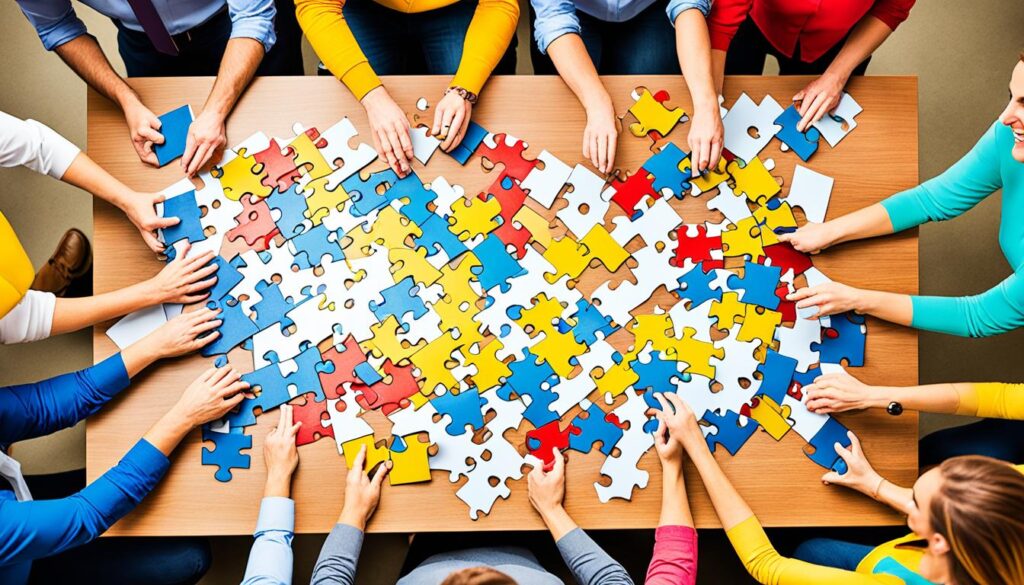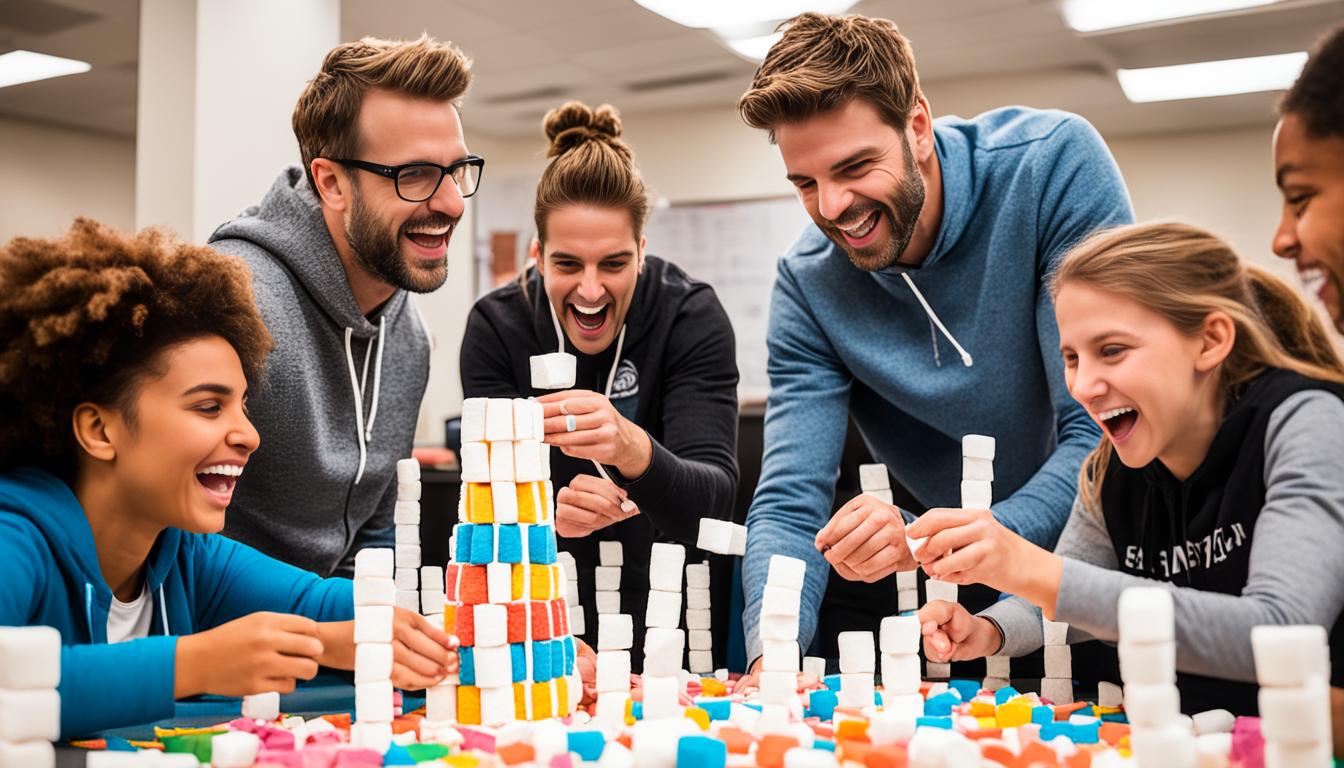Imagine this scenario: You’re part of a team working on a high-stakes project. The deadline is looming, and the pressure is on. As you gather for a meeting, you notice the tension in the room. Everyone is focused on their individual tasks, and there’s a lack of communication and collaboration.
But then, your team leader unveils a surprise. It’s a box full of colorful game cards, each one representing a different team-building activity. With a gleam in their eyes, they explain that these games are designed to enhance team dynamics, improve communication, and boost collaboration.
Curiosity piqued, the team dives into the first activity. Laughter fills the room as you work together to solve puzzles, strategize, and communicate effectively. In just a short time, you can feel the atmosphere shifting. Walls are coming down, barriers are being broken, and the team is starting to work as a cohesive unit.
These team-building games, known as Team Dynamics Game Faces, provide a fun and engaging way to strengthen relationships and foster a thriving work environment. They target important skills like effective team communication, problem-solving, trust-building, and creativity.
By incorporating these games into your team’s development, you can enhance team dynamics and promote a more collaborative and productive workplace. Each game is carefully designed to bring out the best in your team, creating a space where ideas can flow freely and relationships can flourish.
Are you ready to take your team to the next level? Let’s dive into the benefits of employee teamwork games and discover how you can tailor these games to suit your team’s unique dynamics.
Key Takeaways:
- Team Dynamics Game Faces offers a range of interactive team-building activities.
- These games enhance communication, problem-solving, trust-building, and creativity.
- Employee teamwork games promote team bonding, improve collaboration, and foster trust.
- Tailor employee games to suit your team’s specific needs and dynamics.
- Measuring the effectiveness of employee teamwork games is crucial for continuous improvement.
The Benefits of Employee Teamwork Games
Employee teamwork games offer a multitude of benefits for individuals and the team as a whole. These interactive activities are designed to enhance team bonding, improve communication and active listening skills, and foster trust among team members. By engaging in team bonding exercises and participating in group dynamics activities, team members have the opportunity to learn more about each other, build stronger connections, and strengthen collaboration within the team.
One key benefit of employee teamwork games is the improvement of problem-solving abilities. These games present challenges that require teams to work together, brainstorm ideas, and find innovative solutions. This not only enhances critical thinking skills but also promotes creativity and innovation within the team.
Furthermore, employee teamwork games provide a break from the routine of work, allowing team members to relax, have fun, and recharge their energy. This leads to increased motivation and overall satisfaction within the team. When team members engage in enjoyable activities together, it creates a positive and supportive work environment, fostering a sense of belonging and camaraderie.
“Teamwork is the ability to work together toward a common vision. The ability to direct individual accomplishments toward organizational objectives. It is the fuel that allows common people to attain uncommon results.” – Andrew Carnegie
These games also facilitate effective communication and active listening skills. As team members engage in collaborative activities, they learn to express their ideas and opinions clearly and respectfully. This helps to avoid misunderstandings, resolve conflicts, and improve overall team communication.
Employee teamwork games are particularly beneficial for developing team skills in larger organizations, where team members may not have many opportunities to interact regularly. By participating in these games, individuals from different departments or locations can come together, build relationships, and establish better collaboration and synergy.
Ultimately, the benefits of employee teamwork games extend beyond the immediate outcome of the games themselves. The skills and relationships developed during these activities have a lasting impact on the team’s overall performance, productivity, and job satisfaction. Investing in team bonding exercises and group dynamics activities is an investment in the success and well-being of your team.
| Benefits of Employee Teamwork Games | |
|---|---|
| Team bonding | Builds stronger connections and promotes collaboration within the team |
| Communication and active listening skills | Improves effective communication and promotes respectful listening |
| Problem-solving abilities | Enhances critical thinking and fosters creativity and innovation |
| Motivation and satisfaction | Increases motivation and overall satisfaction within the team |
| Establishing collaboration | Builds relationships and collaboration across different departments or locations |
How to Tailor Employee Games for Your Team
When it comes to enhancing the effectiveness of employee teamwork games, customization is key. Tailoring the games to suit the specific needs and dynamics of your team can maximize their impact and promote a more engaging and relevant experience. Consider the following strategies to ensure that the employee games you choose are a perfect fit for your team:
- Assess your team’s size and composition: Understanding the size of your team and the diversity of its members can help you select games that can accommodate everyone and cater to their unique strengths and abilities.
- Consider individual preferences: Take into account the different interests and preferences of your team members when selecting employee games. This way, you can design activities that captivate and motivate each individual, fostering a sense of enjoyment and participation.
- Identify desired outcomes: Clearly define the goals and objectives you want to achieve through the employee games. Whether you aim to improve communication skills, enhance problem-solving abilities, or foster greater collaboration, aligning the games with your desired outcomes will ensure they contribute to the team’s development.
- Incorporate team member feedback: Actively seek input from your team members on their preferences, suggestions, and ideas for employee games. By involving them in the decision-making process, you can create a sense of ownership and make the games more engaging and effective.
Once you have tailored the employee games to suit your team, it is essential to measure their effectiveness. Evaluating the impact of the games will help you identify areas of improvement and make any necessary adjustments for future activities. Some key metrics to consider when measuring the effectiveness of employee teamwork games include:
- Team performance: Observe how the employee games positively influence the team’s overall performance and productivity.
- Communication improvement: Assess the extent to which the employee games enhance communication skills within the team, promoting effective information sharing and collaboration.
- Overall team satisfaction: Gauge the team’s satisfaction and engagement levels after participating in the employee games, as this can indicate their overall success and impact.
By tailoring employee games to suit your team’s unique needs and measuring their effectiveness, you can maximize their impact and create a more engaging and productive work environment.
Team-Building Games for Boosting Efficiency
Team-building games offer a powerful way to enhance collaboration, communication, and overall efficiency within a team. These interactive activities not only create a positive and engaging environment but also contribute to improving learning retention. By incorporating games into the learning process, team members are more likely to internalize information and apply their newly acquired skills in their daily work.
One of the key advantages of team-building games is their ability to establish rapport quickly. This is particularly beneficial when conducting interviews, as team members who have already participated in these games are more adept at building connections and establishing a comfortable atmosphere. Moreover, when engaging with users and visitors, team members who have honed their communication skills through these games can establish rapport quickly, improving the overall user experience.
Team-building games also enhance collaboration skills, problem-solving abilities, and creativity among team members. Through these games, team members learn to work together, leverage each other’s strengths, and find innovative solutions to challenges. This collaborative mindset then permeates the team’s workflows and fosters an environment where efficiency is prioritized.
“Team-building games create a strong sense of camaraderie and establish a foundation of trust within the team. This facilitates open communication, problem-solving, and collaboration, resulting in improved efficiency and productivity.”
To illustrate the impact of team-building games on efficiency, consider the following examples:
Example 1: Learning Retention
In a study conducted by Smith et al., teams that participated in team-building games exhibited higher learning retention compared to teams that followed traditional training methods. By engaging team members in interactive and memorable activities, these games create a more conducive learning environment, ensuring that information is absorbed and retained over time.
Example 2: Rapid Rapport Building
In a customer service setting, teams that regularly engage in team-building games establish rapport with customers more quickly and effectively. This leads to enhanced customer satisfaction, higher conversion rates, and an overall positive brand image.
Example 3: Enhanced Collaboration
Teams that regularly participate in team-building games develop strong collaboration skills, resulting in improved task distribution, effective problem-solving, and streamlined processes. This ultimately leads to higher efficiency and productivity within the team.
Incorporating team-building games into your team’s development strategy can significantly impact efficiency and overall performance. By strengthening collaboration, communication, and problem-solving skills, these games provide the foundation for a successful and highly efficient team.

Conclusion
Team Dynamics Game Faces offers a wide range of team-building games that can significantly impact your team’s collaboration, communication, and overall performance. By incorporating these interactive activities into your team development strategies, you can promote a more dynamic and harmonious work environment where everyone feels connected and valued.
The benefits of these games extend beyond the individual team members, leading to improved teamwork, enhanced problem-solving skills, and increased creativity within the team. Through interactive team development with Team Dynamics Game Faces, you can witness the positive impact on your team’s synergy and productivity.
Invest in Team Dynamics Game Faces and unlock the full potential of your team. With these engaging and effective team-building games, you can foster a culture of collaboration, boost employee morale, and drive success in your organization. Experience the power of interactive team development and see the transformative results for yourself.
FAQ
How can Team Dynamics Game Faces boost collaboration within a team?
Team Dynamics Game Faces offers a range of interactive activities designed to enhance communication, collaboration, and teamwork within your team. These team-building games target important skills like communication, problem-solving, trust-building, and creativity, resulting in improved team dynamics and a more collaborative work environment.
What are the benefits of employee teamwork games?
Employee teamwork games promote team bonding, improve communication and active listening skills, enhance problem-solving abilities, encourage creativity and innovation, and foster trust among team members. These games also provide a fun and engaging way for team members to relax and increase motivation and overall satisfaction.
How can I tailor employee games for my team?
To tailor employee games for your team, consider factors such as team size, individual preferences, and desired outcomes. You can also incorporate feedback from team members to make the games more engaging and relevant. Additionally, measuring the effectiveness of employee teamwork games is crucial to assess their impact and make any necessary adjustments for future activities.
How do team-building games boost efficiency?
Team-building games improve efficiency within a team by enhancing collaboration skills, problem-solving abilities, and creativity. By incorporating games into the learning process, team members are more likely to retain information and put their new skills into practice in their daily work. These games also help in establishing rapport quickly, which is crucial for conducting effective interviews or engaging with users and visitors.
How can Team Dynamics Game Faces enhance team development?
Team Dynamics Game Faces offers a wide range of team-building games that can significantly impact collaboration, communication, and overall performance. By incorporating these interactive activities into your team development strategies, you can promote a more dynamic and harmonious work environment where everyone feels connected and valued.


